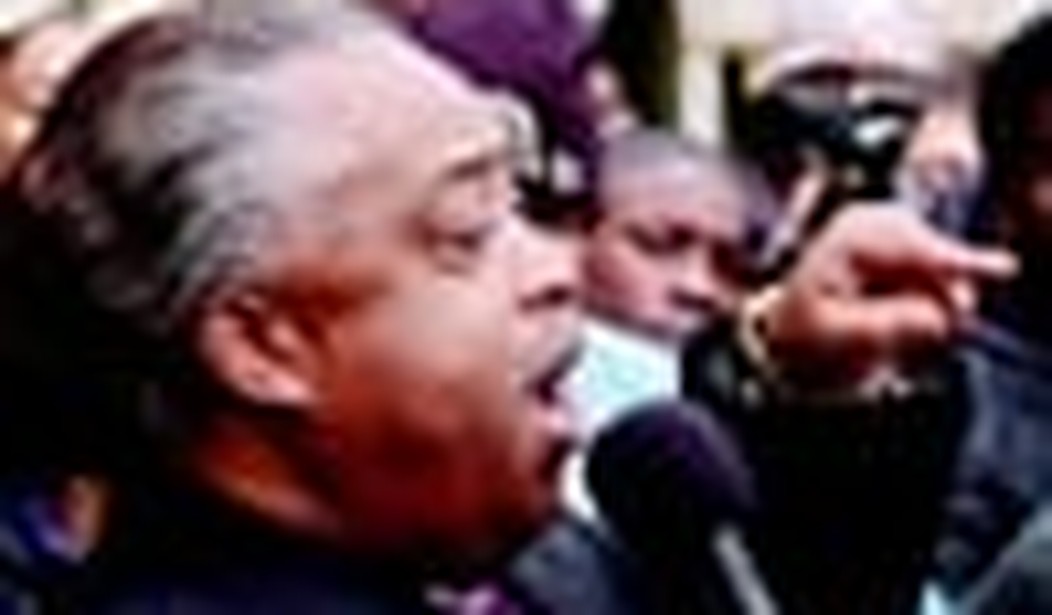To anyone who knew the facts of the case and understood the law, Friday’s acquittal of the three New York Police Department detectives charged in the November 2006 shooting death of Sean Bell was entirely predictable.
Just as predictable has been the reaction from Al Sharpton, who owes his notoriety – and, one presumes, his income – to the culture of grievance from which he sprang and which he so tirelessly strives to perpetuate. On Saturday, Sharpton presided over a rally at his Harlem headquarters and exhorted his followers to “close down” the city of New York. “This city,” he said, “is going to deal with the blood of Sean Bell.”
And so it may, but perhaps not in the way Mr. Sharpton would wish.
Regardless of a given criminal trial’s underlying social and political issues – and seldom has there been a trial more heavily freighted with such issues than this one – the burden of proof remains unchanged: the prosecution must prove beyond a reasonable doubt and to a moral certainty that the defendant is guilty of the crimes alleged against him. All extraneous questions on crime, the police, race, and their respective places in the great social equation have no rightful place in a criminal courtroom.
But these questions do at times creep silently into the courtroom, more particularly into the jury room of a high-profile trial, where some might wish to see cosmic justice produced therefrom. Some jurors have been known to oblige that wish, engaging in jury nullification in the case of some clearly guilty defendants or, even more disturbing, convicting some clearly innocent ones. The three police detectives on trial in the Sean Bell shooting, Gescard Isnora, Marc Cooper, and Michael Oliver, knew this very well when they asked that their case be heard by a judge rather than a jury, placing their fate in the hands of Queens Supreme Court Justice Arthur Cooperman.
Reasonable doubt was to be found everywhere in the case, beginning with the Queens grand jury’s initial indictment handed down in March 2007. Much has been made of the fifty shots fired by the police during the confrontation, twenty of which struck the car Bell was driving, killing him and wounding his two passengers. But of the five officers who fired, only three were indicted and put on trial, suggesting that even the grand jury believed that in the confusion of the encounter on that early morning there was at least some level of justification for the other two to fire their weapons. And if those two had reason to fire, however tragically mistaken it turned out to be, how is it that the defendants’ conduct rose to the level that made it criminal? It didn’t, as Justice Cooperman ruled on Friday.
The prosecution’s efforts were undone by several factors, which Justice Cooperman specified in his verdict. “The court has found,” he said, “that the people’s ability to prove their case beyond a reasonable doubt was affected by a combination of the following factors: the prosecution witnesses’ prior inconsistent statements, inconsistencies in testimony among prosecution witnesses, the renunciation of prior statements, criminal convictions, the interest of some witnesses in the outcome of the case, the demeanor on the witness stand of other witnesses and the motive witnesses may have had to lie and the effect it had on the truthfulness of a witness’s testimony. These factors played a significant part in the people’s ability to prove their case beyond a reasonable doubt and had the effect of eviscerating the credibility of those prosecution witnesses. And, at times, the testimony just didn’t make sense.”
The defendants, Justice Cooperman concluded, reasonably, albeit mistakenly, believed that an armed confrontation was about to take place between Sean Bell and his companions and another group of men that had just left a strip club. “The court has found that the incident lasted just seconds,” Cooperman said. “The officers responded to perceived criminal conduct; the unfortunate consequences of their conduct were tragic.”
Here in Los Angeles there is a term used around the courthouse to describe incidents like the Sean Bell shooting: “awful but lawful.”
Fortunately for some Los Angeles Police Department officers, L.A. County District Attorney Steve Cooley, who is unburdened by ambition for higher office, has shown a willingness to stand up to the kind of pressure Al Sharpton and others exerted on prosecutors in Queens after the Sean Bell shooting. When, for example, “community activists” demanded that an LAPD officer be prosecuted in the 2005 shooting death of 13-year-old Devin Brown at the end of an early morning car chase, Cooley’s office declined to do so, thoroughly explaining the decision in a lengthy document posted on the agency’s website.
Surely the prosecutors in the Sean Bell case knew the weaknesses of their case, weaknesses that they might easily have detailed for the public had they chosen not to take the case to a grand jury. But the peculiar politics of New York demanded otherwise, and three police detectives were forced to endure a trial that the prosecutors knew – or should have known – they could not win.
And now Mr. Sharpton and his acolytes are threatening to shut down New York City, hoping to portray the NYPD as the biggest threat facing the residents in Queens, Brooklyn, Harlem, and the other less fashionable neighborhoods that lie north of 96th Street or beyond the East River. In those neighborhoods, Mr. Sharpton would have you believe, the only guns and drugs to be found are those that have been planted on innocent people by corrupt, racist police officers.
Sharpton’s antics, blithely acquiesced to by Mayor Michael Bloomberg, Police Commissioner Ray Kelly, and the entire New York City political structure, will only inhibit police efforts to improve the quality of life in those neighborhoods most affected by crime. When the next murder victim falls in Queens, Brooklyn, or Harlem, will Al Sharpton be too busy to notice?
Twenty people have been murdered so far this year in the NYPD’s Queens South Patrol Bureau, where the Sean Bell shooting occurred, up from twelve at the same time in 2007. When Mr. Sharpton has finished shutting down the city this week, perhaps he might summon up a similar level of outrage at the fate of even one of those twenty people.
“Jack Dunphy” is the pseudonym of an officer with the Los Angeles Police Department. The opinions expressed are his own and almost certainly do not reflect those of the LAPD management.










Join the conversation as a VIP Member